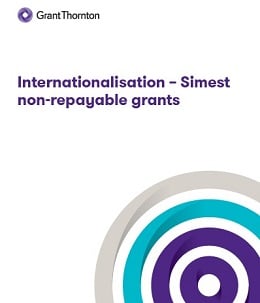Foreword
Significant new provisions have been introduced as concerns non-repayable grants for business internationalisation managed by Simest S.p.A., a company within the Cassa Depositi e Prestiti (deposits and loans fund) Group, further to the European Commission authorisation within the temporary framework for State aids.
In particular, starting from 6 August 2020, new amendments have been introduced to non-repayable grants which broaden the opportunities available to Italian businesses, allowing more of them to access and further strengthening the benefits identified for the seven types of projects specifically provided for internationalisation, also through non-repayable funds for 50% of the investment.
Regulatory references
In March this year, the so-called “Cura Italia” Decree (art. 72 of Law Decree 18/2002) provided for the possibility - using the fund made available under Law Decree n. 251 dated 28 May 1981 (Law 394/1981), so-called revolving fund ex law 394/81 - to make available non-repayable co-financing up to 50% of the amount granted.
In May this year the so-called “Rilancio” Decree (art. 48 of Law Decree 34/2020), among other things, increased the financial allocation under art. 72 of Law Decree 18/2020 and, with reference to the activities of the revolving fund ex law 394/81, cancelled the limitations introduced by the norms on State aids, so-called de minimis threshold.
On 11 June 2020, with a Decree by the Minister of foreign affairs and international cooperation, in collaboration with the Minister of economic development and with the Minister of economy and finance, the extension of the measures provided for under the revolving fund ex law 394/81 for interventions referred to EU Member States entered into force (previously, the revolving fund ex law 394/81 was reserved exclusively to extra EU internationalisation projects).
The EU Commission approval, on 31 July 2020, of the State aid system within the temporary framework for State aid measures to support the economy in the current Covid-19 outbreak (State Aid SA.57891) (2020/N), completed the regulatory framework allowing to obtain grants for seven types of projects, all essentially aimed at the internationalisation of businesses.
In particular, until 31 December 2020, the program offering support in the internationalisation process to all businesses with registered office in Italy and with at least two complete Financial Statements approved and filed (with the exclusion of the programme for International Fairs, Exhibitions and Business Missions, for which a single Financial Statements filed are sufficient) are the following:
- Capitalisation of SMEs;
- Participation in International Fairs, Exhibitions and Business Missions;
- Programmes for the introduction into Foreign Markets;
- Temporary Export Manager;
- E-Commerce;
- Feasibility Studies;
- Technical Assistance Programmes.
Rates applied, guarantees required and amount limitations
The rate applied to the grant is equal to 10% of the reference EU rate, which, as at September 2020, is equal to 0.083%. Subsidised loans, moreover, are exempt from the requirement to provide a guarantee, as an exception to the regulation currently in force on the revolving fund, for applications submitted by 31 December 2020.
All types of investments mentioned above can receive, to date, up to 40% of the non-repayable grants up to a maximum amount of Euro 100,000 (with the exception of the introduction into Foreign Markets, for which the non-repayable amount is equal to 20%). Starting from September 2020, the non-repayable amount will grow up to 50% and the relevant limit to Euro 800,000 of total aids for each business.
Download the PDF file to read the chart summarising the seven types of tools available and the relevant characteristics.

